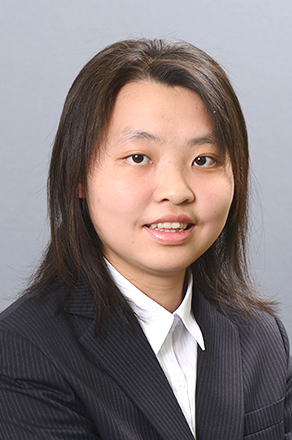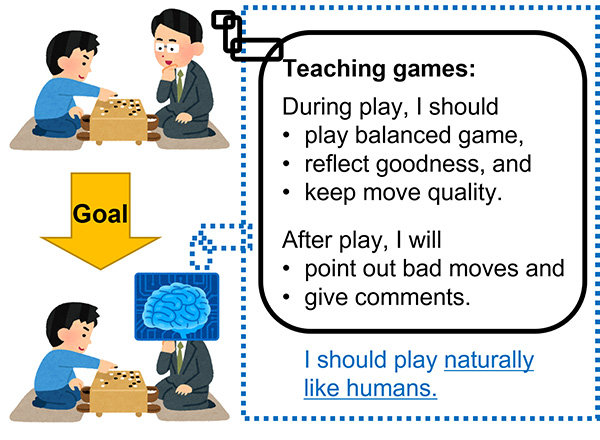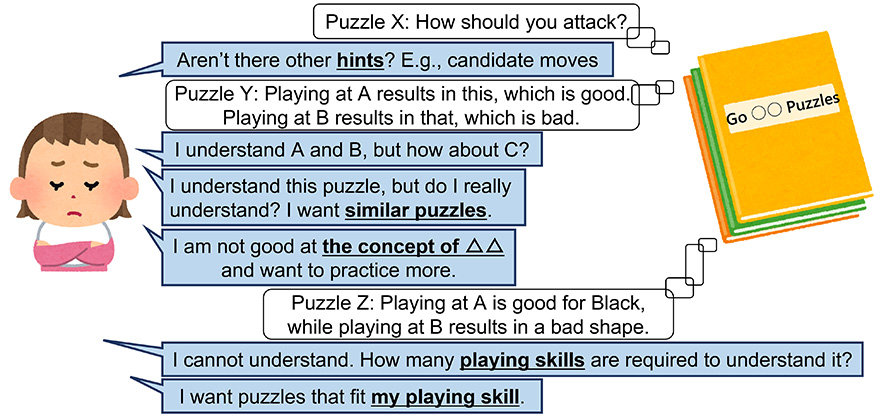
Let's create a more enjoyable world together by utilizing games and AI
Games and Artificial Intelligence Lab
Senior lecturer:HSUEH Chu-Hsuan
E-mail:
[Research areas]
Game Informatics
[Keywords]
Board/Video Game, Puzzle, Tree Search, Supervised/Reinforcement Learning, Strong/Entertaining Game AI
Skills and background we are looking for in prospective students
Most important: have interests in and passions for the research of games and AI. Required: basic knowledge of probability/statistics and programming skills. Preferred: experience in game AI development or machine learning
What you can expect to learn in this laboratory
Students are expected to learn advanced techniques in the field of games and AI. In addition to specialized knowledge, students are expected to acquire the ability to identify and solve problems, to survey and summarize related work, to formulate and verify hypotheses, to think logically and critically, to explain their ideas in easy-to-understand sentences and figures, and to write technical papers and reports.
【Job category of graduates】 Expected to be SEs and data scientists in IT companies, planners and programmers in game companies
Research outline
[Overview]
Games have long been a part of human entertainment and one of the key fields of AI research. In many games, AI players have become stronger than top human players. While powerful and general AI methods are actively studied, researchers also focus on making AI more accessible to humans as society moves toward Society 5.0. We work on these two directions of AI research in games.
* We do not conduct research on designing games.
[Strong AI Players/Solving Games]
We work on creating strong AI players using tree search and reinforcement learning (especially AlphaZero). We have achieved good results in game competitions.
We are also interested in finding out optimal strategies and theoretical values of games (so-called game solving). A simple example is that if both players play optimally in tic-tac-toe, the game ends in a draw.
[Human-centered game AI]

1. Teaching Games
We aim to let AI perform teaching games, one of the methods used by human teachers to teach Go (figure on the right). To achieve this, we research on playing human-like moves, playing good-quality games, and pointing out bad moves. Another goal is to generate explanations or comments on the game states or moves.
2. Procedural Content Generation
Game content refers to various things: maps, music, characters, weapons, puzzles, etc. We work on automatic generation of content that is fun to play or becomes good practice. Examples include the generation of mazes that guide human players, puzzles to practice the T-spin technique in Tetris, and puzzles for Go beginners and intermediate players (motivations in figure below).

Key publications
- Chu-Hsuan Hsueh and Kokolo Ikeda, “Improvement of Move Naturalness for Playing Good-Quality Games with Middle-Level Players”, Applied Intelligence, vol. 54, pp. 1637-1655, Jan. 2024
- Chu-Hsuan Hsueh, Kokolo Ikeda, I-Chen Wu, Jr-Chang Chen, and Tsan-sheng Hsu, “Analyses of Tabular AlphaZero on Strongly-Solved Stochastic Games”, IEEE Access, vol. 11, pp. 18157-18182, Feb. 2023
- Chu-Hsuan Hsueh and Kokolo Ikeda, “ Can We Infer Move Sequences in Go from Stone Arrangements?”, Advances in Computer and Games, Nov. 2023
Teaching policy
Research topics are decided respecting students' hopes with consultation. We provide students with materials on how to do research/improve presentation skills and practice projects. We expect students to come to lab every weekday (no core time). We have weekly seminars (1 presentation per month) and individual meetings, and weekday short meetings at noon. We also provide guidance as needed. The goal is to reach a level to present at domestic conferences.
[Website] URL : https://www.jaist.ac.jp/~hsuehch/lab